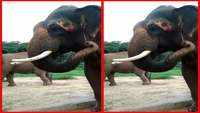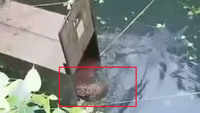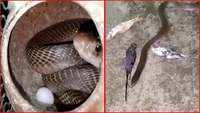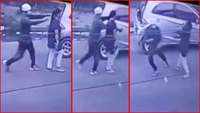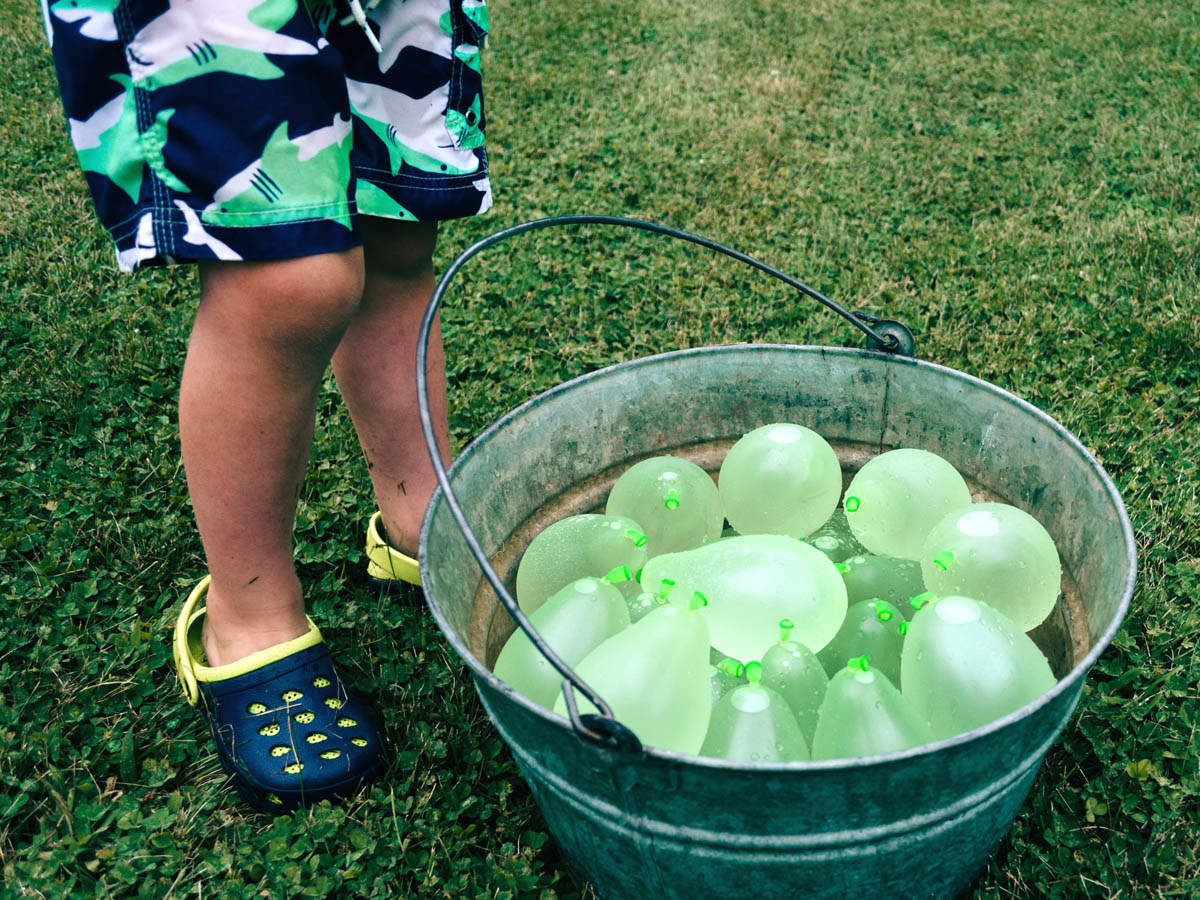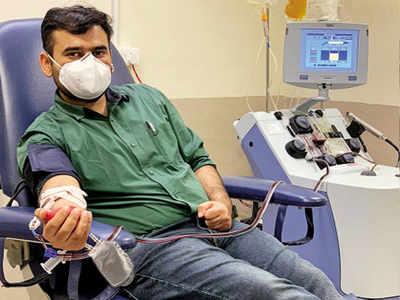
NOIDA: From Covid warrior to patient and now plasma donor, Dr Satyam Arora has seen the pandemic from very close. His primary learning, he says, is that Covid patients need to be treated with compassion because of the anxieties and uncertainties they have to deal with, which get accentuated by the quarantine and isolation.
The 36-year-old, an assistant professor of transfusion medicine at Child PGI who also happens to be leading the ICMR plasma therapy trials at the hospital – now a Covid facility -- had tested positive for Covid-19 on May 28. He was in the ‘mild infected’ category but spent nine days in hospital followed by about two and a half weeks of home recovery. On Friday, he donated 500 ml plasma (the maximum that a donor can give at a time), the first by a recovered health care personnel from the hospital.
Afterwards, he told TOI he had no health complications and had decided to throw himself further into research. “A minimum of 21 days from discharge is taken before a recovered patient can donate plasma. In my case it took long as my recovery at home took over two weeks. Since I joined work in early July, I waited for about 10-15 days before I was sure I could donate, which I did on Friday,” said Arora. Dr DK Gupta director, of Child PGI, said, “He is a good example to others who have recovered from Covid-19 infection to come forward and donate plasma to help patients. There are no risks or side effects to this process.”
Arora, who is a Delhi resident, said he does not know how he got infected. “I live in Delhi and commute for work to Noida daily. I do not know where I got the infection from – whether at the hospital in Noida or in Delhi. My mother also got the infection around the same time and we were admitted to a private hospital where I had high fever for seven days followed by dehydration, dryness of mouth, loss of taste and body ache. Though my condition was mild as compared to my mother, who was in a moderate condition, we both got discharged on June 19,” said Arora. He said he had decided to donate plasma while recovering. “Since I’m involved in the ICMR’s national trials in convalescent plasma treatment (CPT), my main concern was the unfinished work I had after I was detected positive. Therefore, it was important for me to opt for plasma donation once I recovered as it was something I wanted to do to encourage more donors to come forward,” he said. Arora said the long recovery period was stressful. “At the most, I had thought I’ll be out in three-four days. But I was unable to function even after my discharge because of weakness and dehydration. My biggest challenge was to keep myself motivated and determined,” said Arora, adding he got tremendous support from his colleagues and seniors. “I was asked not to hurry back to work and given light shifts when I finally joined in early July.”
Being on the other side helped him get a patient’s perspective. “I realised what a patient goes through. The human disconnect is difficult to deal with... Having a two-year-old daughter, my biggest difficulty was being unable to explain my absence to her and staying away from her even after I went home,” he said, adding, “Now, I am more patient and empathetic towards Covid patients as I can relate to their anxiety.”
The 36-year-old, an assistant professor of transfusion medicine at Child PGI who also happens to be leading the ICMR plasma therapy trials at the hospital – now a Covid facility -- had tested positive for Covid-19 on May 28. He was in the ‘mild infected’ category but spent nine days in hospital followed by about two and a half weeks of home recovery. On Friday, he donated 500 ml plasma (the maximum that a donor can give at a time), the first by a recovered health care personnel from the hospital.
Afterwards, he told TOI he had no health complications and had decided to throw himself further into research. “A minimum of 21 days from discharge is taken before a recovered patient can donate plasma. In my case it took long as my recovery at home took over two weeks. Since I joined work in early July, I waited for about 10-15 days before I was sure I could donate, which I did on Friday,” said Arora. Dr DK Gupta director, of Child PGI, said, “He is a good example to others who have recovered from Covid-19 infection to come forward and donate plasma to help patients. There are no risks or side effects to this process.”
Arora, who is a Delhi resident, said he does not know how he got infected. “I live in Delhi and commute for work to Noida daily. I do not know where I got the infection from – whether at the hospital in Noida or in Delhi. My mother also got the infection around the same time and we were admitted to a private hospital where I had high fever for seven days followed by dehydration, dryness of mouth, loss of taste and body ache. Though my condition was mild as compared to my mother, who was in a moderate condition, we both got discharged on June 19,” said Arora. He said he had decided to donate plasma while recovering. “Since I’m involved in the ICMR’s national trials in convalescent plasma treatment (CPT), my main concern was the unfinished work I had after I was detected positive. Therefore, it was important for me to opt for plasma donation once I recovered as it was something I wanted to do to encourage more donors to come forward,” he said. Arora said the long recovery period was stressful. “At the most, I had thought I’ll be out in three-four days. But I was unable to function even after my discharge because of weakness and dehydration. My biggest challenge was to keep myself motivated and determined,” said Arora, adding he got tremendous support from his colleagues and seniors. “I was asked not to hurry back to work and given light shifts when I finally joined in early July.”
Being on the other side helped him get a patient’s perspective. “I realised what a patient goes through. The human disconnect is difficult to deal with... Having a two-year-old daughter, my biggest difficulty was being unable to explain my absence to her and staying away from her even after I went home,” he said, adding, “Now, I am more patient and empathetic towards Covid patients as I can relate to their anxiety.”
Quick Links
Kerala Coronavirus Helpline NumberHaryana Coronavirus Helpline NumberUP Coronavirus Helpline NumberBareilly NewsBhopal NewsCoronavirus in DelhiCoronavirus in HyderabadCoronavirus in IndiaCoronavirus symptomsCoronavirusRajasthan Coronavirus Helpline NumberAditya ThackerayShiv SenaFire in MumbaiAP Coronavirus Helpline NumberArvind KejriwalJammu Kashmir Coronavirus Helpline NumberSrinagar encounter
Get the app

